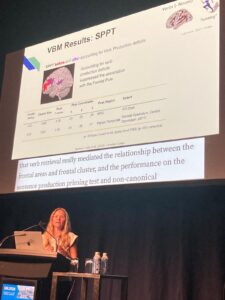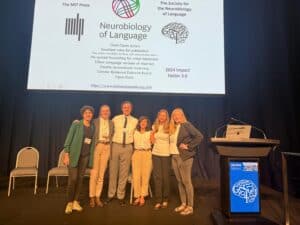 Dr. Sladjana Lukic, assistant professor in the School of Communication Science and Disorders, delivered two presentations at the 62nd Annual Meeting of the Academy of Aphasia in Nara, Japan, and she gave a talk in a symposium at the Society for the Neurobiology of Language Conference in Brisbane, Australia, in October.
Dr. Sladjana Lukic, assistant professor in the School of Communication Science and Disorders, delivered two presentations at the 62nd Annual Meeting of the Academy of Aphasia in Nara, Japan, and she gave a talk in a symposium at the Society for the Neurobiology of Language Conference in Brisbane, Australia, in October.
In Japan, Lukic presented her study “Neurocognitive patterns of verb production deficit therapy: a single case with logopenic variant Primary Progressive Aphasia.” This research focused on a treatment study in which she successfully identified both behavioral and neural changes following therapy using Verb Network Strengthening Treatment—a therapy aimed at improving noun-verb production as interconnected units, which makes this rare and unique attempt to observe generalizations in spontaneous speech.
“Findings from this study allow us to form evidence-based, effective treatment suggestions for individuals with Primary Progressive Aphasia (PPA), and better understand how the brain processes language and maintains language functions in progressive diseases. However, we should be aware that this improvement is not always possible, so the idea is not bringing back words but increasing communication competence,” Lukic said.
Her second presentation in Japan, titled “The production of clitics in Serbian speakers with acquired aphasia,” explored the omission of clitics (function words) in the speech production of individuals with post-stroke aphasia. This study is particularly unique because it focuses on Serbian, a language with a rich system of clitics. Collaborating with Professor Vukovic from Serbia, Lukic examined how aphasia impacts clitic production, a phenomenon that has been widely studied in languages such as English, Catalan, Spanish, Italian, and Greek.
“The importance of this study is not only that the findings may provide insights into a better understanding of grammatical impairments in Serbian speakers with aphasia, but also this is the first study of our knowledge to be done in the Serbian–speaking population,” said Lukic. “There is a clear need for more cross-linguistic research.”
 In Australia, Lukic presented her talk at the symposium, titled “Towards modern, theory-driven approaches to grammar in aphasia,” where she provided a comprehensive overview of linguistic theories of syntax deficits and data gathered from both progressive and stroke aphasia patients.
In Australia, Lukic presented her talk at the symposium, titled “Towards modern, theory-driven approaches to grammar in aphasia,” where she provided a comprehensive overview of linguistic theories of syntax deficits and data gathered from both progressive and stroke aphasia patients.
“Now, more than ever before, when new and powerful methods, such as AI-driven prediction models are introduced into the research practice, successful classification studies based on a theoretical framework and careful selection of language features are essential,” Lukic said. “Scientific research might be challenging and sometimes hard, but it comes with a great opportunity to exchange ideas, experiences, and knowledge and learn from some of the most interesting people in the world,” Lukic said.

